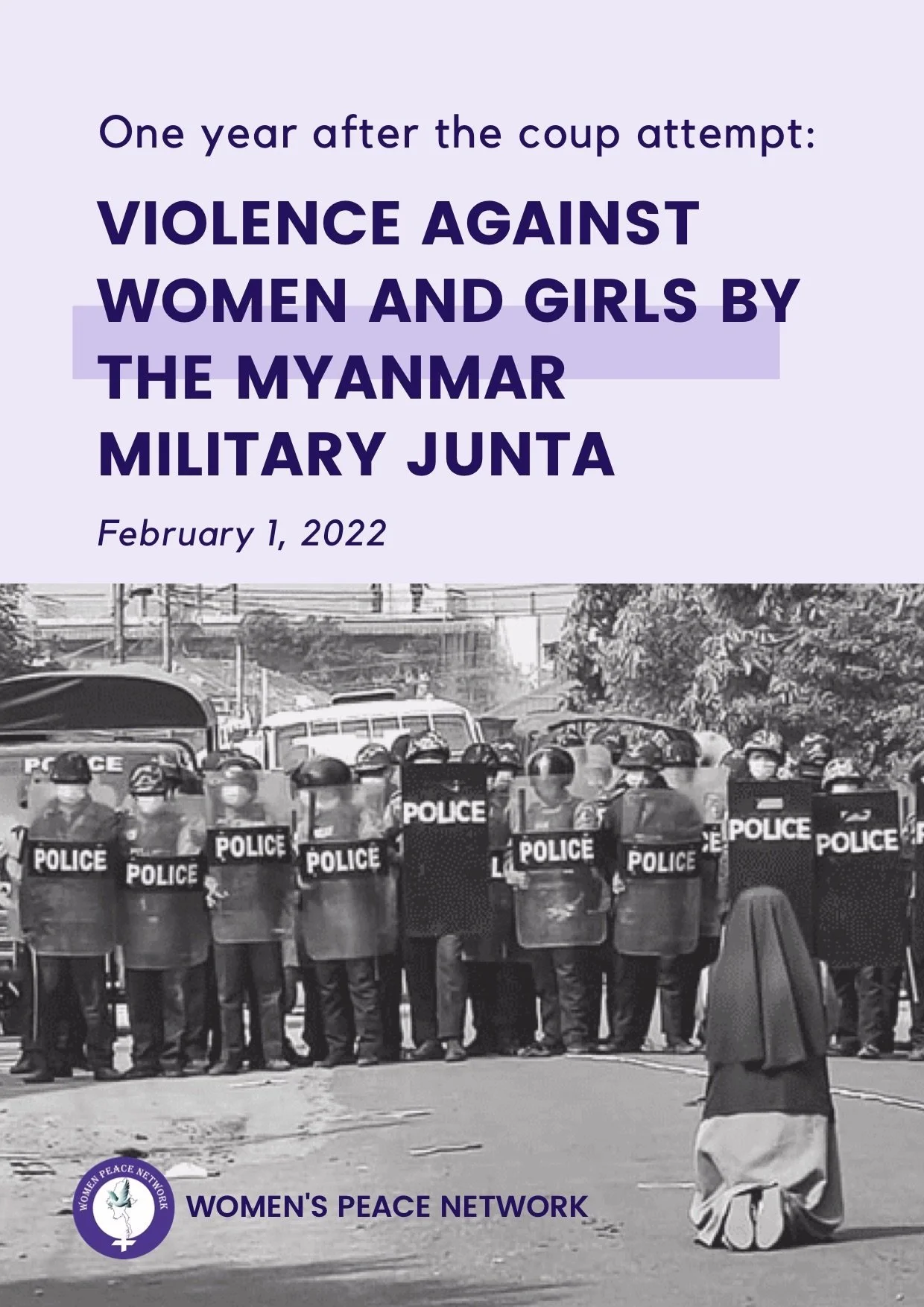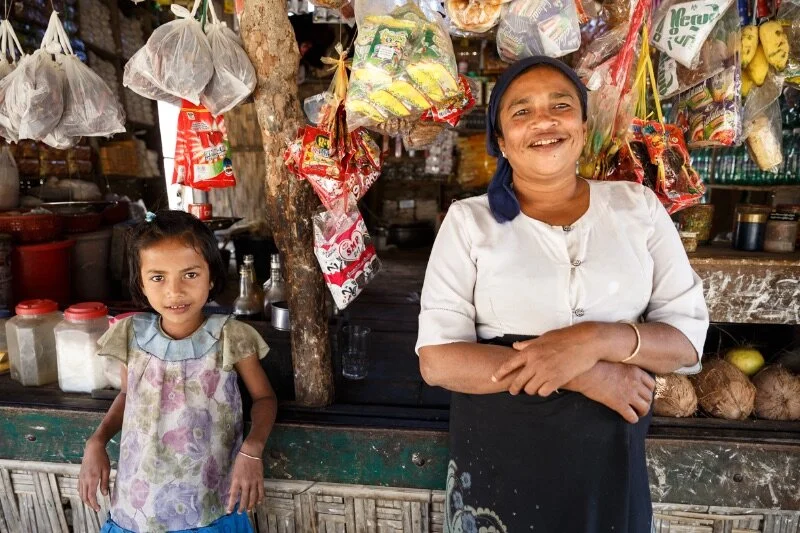Reports
BRIEFING PAPER: Four years after the Burmese military’s attempted coup
February 3, 2025
Four years after the Burmese military’s attempted coup on February 1, 2021, Myanmar’s human rights and humanitarian crisis is on the verge of a total collapse with devastating gendered effects. Widespread and intensifying atrocities continue to take place across the country, with the Burmese military rightfully accused of committing crimes against humanity and war crimes against civilians. Genocidal conditions have also exacerbated in Rakhine State, where access to humanitarian aid is now nonexistent. While the people of Myanmar – especially youth – tenaciously persist in their nationwide resistance, their sacrifice for an inclusive federal democracy unfortunately remains underappreciated worldwide.
Briefing paper: The situation of Women, Peace, and Security in Myanmar
October 24, 2024
On February 1, 2021, the Burmese military attempted a coup against an elected government, triggering a people-led pro-democracy movement marked by organized protests, civil disobedience, and armed resistance. The military’s attempted coup triggered a cascade of crises—economic, education, humanitarian, refugee, and political—that has devastated the livelihood and protection conditions of civilians.
Report: Atrocities against Rohingya in Rakhine State, Myanmar
The report addresses the increasingly lethal conditions to which approximately 600,000 Rohingya civilians have been subjected since the November 2023 resumption of an armed conflict between the Burmese military and the Arakan Army. It focuses on how Rohingya in Rakhine State, or “Arakan,” are now being systematically targeted with atrocities, on top of being indiscriminately caught in the crossfire of the conflict. It provides comprehensive recommendations to the international, regional and domestic community.
Factsheet: The situation of women of Myanmar
March 8, 2024
Briefing paper: The Rohingya boat crisis: Recent developments and key contributing factors in South and Southeast Asia
March 4, 2024
In this briefing paper, Women’s Peace Network (“WPN”) addresses the deteriorating situation of Rohingya across South and Southeast Asia, and draws attention to the deadly sea crossings – the “boat crisis” – and those who have been forced into it: the “boat people.” It analyzes the background and key contributing factors to the boat crisis as a whole, including its root causes, and life-threatening abuses faced by Rohingya boat people, such as those who were recently permitted to land in Aceh, Indonesia. WPN also provides recommendations to regional and international actors to effectively and comprehensively address the crisis, as well as to ensure Rohingya’s safe, voluntary, sustainable, and dignified repatriation in the near future.
Factsheet: Myanmar’s human rights & humanitarian crisis
February 1, 2024
submission to the united nations special rapporteur on the situation of human rights in Myanmar: the situation of women since the burmese military’s attempted coup
December 22, 2023
In this submission to the U.N. Special Procedures, and in line with its calls, Women’s Peace Network (“WPN”) analyzes the ways in which the Burmese military’s attempted coup in 2021 have affected the country’s women in particular.
Submission to the United Nations Special Rapporteur on human rights defenders: The situation of women human rights defenders in Myanmar
Based on its area of expertise as a non-governmental organization working with ethnic and religious minorities for peace and human rights – including women’s rights – in Myanmar, Women’s Peace Network would like to draw the Special Rapporteur’s attention to the country’s situation of women human rights defenders. It is WPN’s understanding that its analyses in this submission may be applied to relevant conflicts and crisis-affected settings other than those of Myanmar. WPN hopes that its submission will help encourage the international community to take comprehensive and concrete actions to support WHRDs and their vital work across the world.
“We are targeted for being Rohingya in Myanmar and everywhere”
March 21, 2023
This report focuses on the intensifying human rights and humanitarian catastrophe targeting the Rohingya community in Myanmar, and other grave rights violations confronting its refugees in South and Southeast Asia. The report also addresses the many ways in which such violations impact women and girls.
joint Submission to the United Nations Special Rapporteur on trafficking in persons and protection of refugees, stateless persons, and internally displaced persons: the situation of rohingya and their deadly sea crossings
February 28, 2023 | Refugees International
Women’s Peace Network and Refugees International submitted a report, titled “The situation of Rohingya and their deadly sea crossings,” to the United Nations Special Rapporteur on trafficking in persons and protection of refugees, stateless persons, and internally displaced persons in response to the call for contributions on the access to international protection of victims of trafficking in persons or persons at risk of trafficking.
Submission to the United Nations Special Rapporteur on the situation of human rights in Myanmar: The situation of Rohingya IDPs and refugees in south and southeast asia
January 27, 2023
Women’s Peace Network submitted a report, titled “The situation of Rohingya IDPs and refugees in South and Southeast Asia,” to the United Nations Special Rapporteur on the situation of human rights in Myanmar in response to the call for contributions on the international community's treatment of those fleeing Myanmar.
panel report: avenues to accountability -- Sexual violence in myanmar
April 1, 2022
On March 13, 2022, the first day of the Commission on the Status of Women’s (CSW) sixty-sixth session, Women Peace Network (WPN) and Global Justice Center (GJC) held a side event on the Myanmar military’s widespread and strategic use of violence against women in Myanmar.
Rohingya Update: Arbitrary Arrest and Detention of Rohingya since the attempted coup
March 2, 2022
This briefer provides a brief, on-the-ground situation update of Rohingya and demonstrates the way in which the Myanmar military and security forces are committing arbitrary arrest and detention, including by issuing restrictions to the group's movement, to continue their strategic persecution of Rohingya.
Special briefer
February 1, 2022
This briefer describes the situation of women and girls since the Myanmar military and security forces’ coup attempt on February 1, 2021 and its ensuing humanitarian crisis, and their systematic and widespread attacks of violence – extrajudicial killing, arbitrary arrest and detention, and torture and sexual violence – against this population in particular.
PANEL REPORT: Myanmar Insights — Violence Against Women Amid Coup (March 29)
April 6, 2021
On March 29, Women Peace Network held the inaugural webinar of its series -- Myanmar Insights -- on the Myanmar military’s continued use of violence against women in Myanmar and increasing risk of atrocity crimes across the country. Opened by Anjali Mohan (Senior Legal Advisor at Women’s Peace Network), the 90-minute panel was moderated by Wai Wai Nu (Founder and Executive Director of Women’s Peace Network) and led by AMT (Representative at General Strike Committee of Nationalities), Esther Ze Naw (Democracy and Youth Activist), Khin Ohmar (Founder and Chair of the Advisory Board of Progressive Voice), and Moon Nay Li (Advocacy Officer and Spokesperson at Kachin Women’s Association Thailand); Karen Smith (Special Advisor of the United Nations Secretary-General on the Responsibility to Protect) provided closing remarks. The panel discussion began with a moment of silence for all the fallen heroes, including Women for Justice’s Ma Arr Khu.
This report presents the five key themes as illustrated by our speakers.
UNIVERSAL PERIODIC REVIEW SUBMISSION
July 9, 2020
The human rights violations described in this submission are supported by research conducted by WPN coordinators on the ground in Rakhine State and Bangladesh and reports from news media, NGOs, and UN agencies. WPN conducted virtual consultations regarding the submission with Rohingya community leaders, women, men and youth groups, who also provided input into the recommendations set forth here.
RAKHINE REPORT: WE USED TO HAVE PICNICS TOGETHER
March 8, 2020
WPN interviewed both Rohingya and Rakhine women about their memories and experiences growing up in Rakhine State. Practices of mutual aid, play, shared food and picnic culture, and, most importantly, peace, offer new tools for questioning dominant knowledge about “Buddhists” and “Muslims” in Rakhine state, as well as new understandings of the structures naturalize the subjugation of Muslim women in Myanmar as well as the exclusion of Rohingyas more broadly.
The findings from this report also highlight the importance of centering the experiences and memories of diverse women in Rakhine when designing peacebuilding solutions for the region and Myanmar more broadly. Through stories of both Rohingya and Rakhine women, it is also evident that women participation is necessary to bring about peaceful and effective change in Rakhine State.
REPORT TO THE COMMITTEE ON ELIMINATION OF DISCRIMINATION AGAINST WOMEN ON THE REQUEST FOR AN EXCEPTIONAL REPORT FROM MYANMAR
July 2018 | Karen Women’s Organization, Progressive Voice, and ALTSEAN-BURMA
This report is prepared in response to the request by the Committee on Elimination of Discrimination against Women (“CEDAW Committee”) for an exceptional report from Myanmar regarding the situation of women and girls from northern Rakhine State. In August 2017, decades of persecution and abuse of the Rohingya ethnic minority in Rakhine State escalated to new levels when Burma’s security forces engaged in a violent campaign that killed at least 6,700 people in the first month alone1 and forced 706,000 refugees to flee to Bangladesh.2 In this brutal campaign—which has the “hallmarks of genocide,” according to Yanghee Lee, the Special Rapporteur on the Situation of Human Rights in Myanmar3— women and girls have been uniquely vulnerable to rights violations due to compounding forms of discrimination from being both Rohingya and female. Most notably, Rohingya women and girls have been subjected to widespread rape and sexual violence perpetrated by security forces.
SUBMISSION TO THE 64TH SESSION CEDAW COMMITTEE FOR CONSIDERATION OF MYANMAR’s combined fourth and fifth periodic reports
June 2016
Women throughout Myanmar face discrimination. Targeted for their religion and ethnicity in addition to their gender, Rohingya women confront multidimensional discrimination, as each form of discrimination compounds the other. Since the Concluding Observations in 2008, the conditions for Rohingya and other Muslim women have deteriorated precipitously, making the already oppressive situation desperate for many. The Government has continued, expanded, and entrenched policies limiting Rohingya freedom of movement, marriage, childbirth, and access to education, healthcare, and livelihoods—policies that often have a heightened impact on women. The Government has continued to deny Rohingya citizenship and gone further to revoke their right to vote and participate in elections for the first time. It has also failed to adequately protect victims or address large scale violence against Rohingya.
UNIVERSAL PERIODIC REVIEW - MYANMAR (BURMA), SUBMISSION TO THE OFFICE OF THE HIGH COMMISSIONER FOR HUMAN RIGHTS
March 2015
Through law and practice, the Rohingya, a Muslim minority group of over one million who have been residing in northern Rakhine (Arakan) for hundreds of years, have been denied the rights of citizens of Myanmar. Even more disturbingly, they have for decades been denied their fundamental rights as humans under international law. In the four years since the last Universal Periodic Review of Myanmar, discrimination, violence, and other forms of abuse against the Rohingya and other Muslims in Myanmar have significantly increased despite Myanmar’s internationally applauded steps toward democracy. The human rights violations described in this submission are supported by Women’s Peace Network - Arakan (WPNA) research conducted by coordinators on the ground in Arakan State and reports from news media, NGOs, and UN agencies.




